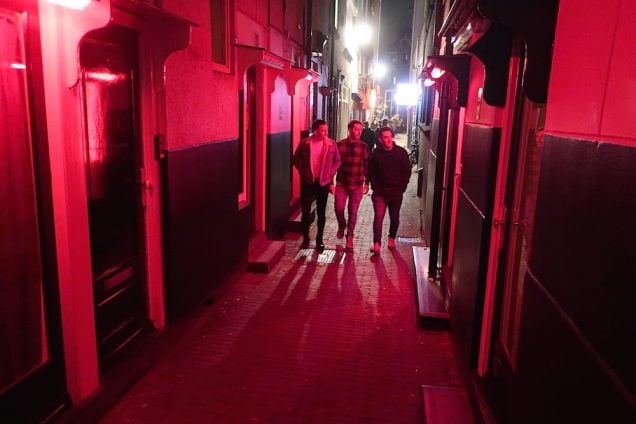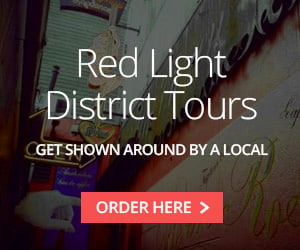
Karte des Amsterdamer Rotlichtviertels
Navigate Amsterdam’s Red Light District: Free Interactive Map & Travel Guide

Planning to explore Amsterdam’s Red Light District? Our free, interactive Red Light District map helps you navigate De Wallen with ease — highlighting top-rated bars, local restaurants, coffeeshops, museums, window brothels, and hidden historical landmarks. Whether it’s your first visit or your fifth, this smart guide ensures you won’t miss a thing.
Discover the vibrant streets where history and modern allure meet, offering a captivating experience. Let’s begin your exploration of this iconic district together.
VISIT MOULIN ROUGE

Moulin Rouge in Amsterdam.
Our Local Guide’s Insights
Our local guides have spent years exploring every nook and cranny of the Red Light District, uncovering hidden gems and sharing fascinating stories with our guests.
We find that Amsterdam Red Light District offers something for everyone, whether you’re interested in history, entertainment, or simply soaking up the unique atmosphere.
From steamy red light windows to trendy Cafés or tantalising Sexshows, the Red Light District has something for everyone.
The Red Light District maps listed below ensures you won’t miss a thing. Whether you’re a curious first-timer or a seasoned traveler, let us help you navigate this iconic neighborhood with confidence and excitement.
🎧 Want expert insights while you walk? Download our Red Light District Audio Guide App for a self-paced, GPS-based tour

Die Gasse daneben Coffeeshop The Bulldog.
Best Amsterdam Red Light District Maps
Looking for Amsterdam Red Light District map & Red Light District directions? Start your unforgettable journey with our free guide, the perfect key to exploring the city’s most famous area.
The first Red Light District map below shows all window brothels located in this area of Amsterdam. Outlined in red is the official Red Light District of Amsterdam which is called “De Wallen" In Holländisch. Die Rotlichtlogos unseres Unternehmens stellen Adressen dar, an denen sich Fensterbordelle befinden.
HOL DIR JETZT AMSTERDAM APP >
There are currently a total of 201 window brothels in the Red Light District and approximately 350 Sexarbeiterinnen in this area. The red light windows can be rented twice a day; during the daytime and nighttime. Most sex workers prefer to work during the nightshifts between 8 pm and 4 pm.

Amsterdam’s Oudezijds Achterburgwal.
Zoom in and out on the Amsterdam Red Light District Map below and discover the area digitally. Below, a Red Light District map dedicated to the best restaurants, the best bars, the best coffeeshops (cannabis cafes) and erotic entertainment can be found beneath the Red Light District map with window brothels.
Additionally it includes a third map containing the best hotels in Amsterdam Red Light District with direct links to make a reservation.
1 | Window Brothels Map

A window brothel on the Oudezijds Voorburgwal.
Window prostitution in Amsterdam was introduced from the 1950s. This form of sex work is also legal as long as the laws are followed and as long as it takes place in licensed window brothels. It’s something that is inextricably linked to Amsterdam and the liberal way of thinking of the Dutch.

Amsterdam has three Red Light District area’s. The Red Light District map below shows all the 288 Fensterbordellen of the so called ‘Wallen‘ area. The biggest and most famous Red Light District of the world.
On your mobile device: combine two fingers to scroll through the map.
© AmsterdamRedLightDistrictTour.com
Amsterdam Blue Light District

The blue light district in Amsterdam during the daytime. Transgenders work here.
What Is The Blue Light District?
The blue light district in Amsterdam is an area within the Red Light District with several transgender sex workers. Some transgender prostitutes use blue lights in their window brothels to indicate that they are different as the female sex workers.
It concerns two or three streets in the Red Light District (De Wallen). It mainly concerns the Bloedstraat and the Gordijnensteeg.

Blue-lit windows in Amsterdam.
Most transgender sex workers in the blue light district (still) have their male genitals and are visited by men. In the Bloedstraat (in the so-called Blue Light District) are the window brothels with transgender sex workers as well as female prostitutes.
As local guides, we see the Blue Light District as a unique contrast to the city’s hustle and bustle. Despite its lively atmosphere, visitors can uncover a diverse community, including transgender sex workers, who play a significant role in its vibrancy.
More details can be found in the Frequently Asked Questions.
Red Light District Tours
Learn everything about this fascinating area during a red light district tour with real stories from 22 experts. Download our Amsterdam Audio Stories app and become a real Amsterdam-connoisseur. Enhance your exploration with our Amsterdam Audio Stories app. Immerse yourself in captivating tales from local experts as you navigate the Red Light District. Available now on our website or directly from the Apple App Store oder Google Play Store.
GET THIS APP! >
2 | Entertainment Map
Here below you can find an interactive Amsterdam Red Light District Map containing Restaurants, Cafés, Coffeeshops und Sexshows.
Or, discover the best hookup sites and get a sex date in Holland.
- Click on the circles within the Red Light District Map to get more details.
- Discover the zoom-in and zoom-out function.
- See the precise locations of all attractions & venues.
Blue = Restaurants | Yellow = Bars & Cafes | Green = Coffeeshops | Red = Sex Shows
© AmsterdamRedLightDistrictTour.com
Die 10 besten Sexshows in Amsterdam
We listed the 10 best sex shows in Amsterdam for men and women. The overview contains all necessary details like opening hours, prices, photos and a description of the shows. The sex shows include strip clubs, a peep show, a 5D porn cinema, lap dance bars, erotic theaters and even male stripteases for women. We offer the best Tickets für das Moulin Rouge online.
There’s even a male strip club in Amsterdam with male strippers who give amazing shows for women.
10 SEX SHOWS IN AMSTERDAM >
3 | Hotels Map
Discover our curated selection of top-rated hotels within Amsterdam’s Red Light District, catering to various budgets. Enjoy the convenience of staying amidst historic architecture, delectable dining options, vibrant bars, and authentic coffeeshops—all just steps away from your accommodation.
The map below contains a selection of the 10 best hotels in Amsterdam Red Light District. In the surroundings of all these Amsterdam hotels you’ll find some of Amsterdam’s oldest buildings, great restaurants, fun bars and coffeeshops.
© AmsterdamRedLightDistrictTour.com
One of the main advantages of staying in the Red Light District is that it’s centrally located. It’s just a 10 minute walk from Central Station. Moreover there is always something to do in Amsterdam Red Light District!
Top 10 Amsterdam Red Light District Hotels

Click on the button below if you want to see 10 hotels in different price categories.
10x RED LIGHT DISTRICT HOTELS >
When planning your visit with our Amsterdam Red Light District map, it’s easy to see how centrally located and walkable this historic area is. For those wanting to explore the district by day and retreat to elegance by night, booking one of the luxury hotels in Amsterdam nearby can elevate your entire experience. Many of these upscale hotels are just minutes from iconic Red Light District spots like Oude Kerk and the canal-side windows, offering a seamless mix of cultural immersion and five-star comfort.
4 | Street Names
Familiarize yourself with the charming streets of Amsterdam’s Red Light District. From the bustling Warmoesstraat to the historic Oudezijds Achterburgwal, each street offers a unique glimpse into the city’s rich heritage and vibrant culture.

Bloedstraat, Boomsteeg, Dollebegijnensteeg, Geldersekade, Heintje Hoeksteeg, Koestraat, Korte Niezel, Korte Stormsteeg, Lange Niezel, Molensteeg, Nieuwebrugsteeg, Nieuwmarkt, Oudezijds Armsteeg, Oudezijds Voorburgwal, Oudezijds Achterburgwal, Oudekerksplein, Oudekennissteeg, Papenbrugsteeg, Spooksteeg, Sint Jansstraat, Sint Annendwarsstraat, Trompettersteeg, Warmoesstraat, Zeedijk.

5 | Project 1012
What is Project 1012?
Launched by the City of Amsterdam in 2007, Project 1012 aims to reshape the Red Light District into a safer, more welcoming neighborhood. This initiative reduced the number of brothel windows and introduced boutique shops, galleries, and cultural spaces. It’s a key reason why today’s De Wallen offers a unique mix of old-world charm and modern transformation.
The Red Light District map has significantly changed in the last few decades. Especially during the last 10 years. In 2007, the City of Amsterdam started with a gentrification-plan called Project 1012, named after the zip code of the Red Light District.

This is the Trompettersteeg – Amsterdam’s most narrow alley.
The intention of Project 1012 was to change the neighbourhood, shatter supposed criminal infrastructure and gentrify the area. The local government spend millions of euros of tax money to buy out brothel owners, so that window brothels could be changed into fashion stores, art galleries, food shops, etc.
However, criminal practices were hardly found to be happening inside Amsterdam’s Red Light District but elsewhere in the Netherlands. For example; in illegal sex clubs, within the online der Prostitution angesehen werden. business and in private houses. For those types of activities there aren’t any forms of regulated oversight or control like there is in Amsterdam’s Red Light District.

Moulin Rouge is one of the 10 sex shows in Amsterdam.
The City of Amsterdam wasn’t able to close down a single window brothel because of crime or illegality. The only thing they could do to bring down the number of window brothels was to buy the expensive city centre property and close down window brothels that way.
This expensive policy costed the Dutch taxpayer 108 million euro. Through these measures, the municipality of Amsterdam was able to close down a total of 126 window brothels around Amsterdam Red Light District since 2007, thus significantly altering the Red Light District map.
Currently there are 201 Fensterbordelle left in Amsterdam’s Red Light District and approximately 350 sex workers.

The main street in De Wallen has windows on both sides. It contains most of the Sexshows too.
6 | Amsterdam Red Light District is Safe
Is Amsterdam’s Red Light District Safe?
Yes — in fact, it’s one of the safest parts of central Amsterdam. The area is heavily monitored with security cameras, a visible police presence, and city-funded safety initiatives. Whether you’re visiting during the day or after dark, our Red Light District map includes marked safe walking routes and tips to help you explore confidently.

The police, enforcers and hosts of the city are often visibly present in this neighborhood. In addition, there are also 50 police cameras present and there is a lot of social control from all the millions of yearly visitors and the 4,305 local residents. (source)
7 | Amsterdam App
Learn more about Amsterdam’s most fascinating area and hear stories of 22 experts.
Historians, sex workers, police officiers, entrepreneurs and other experts explain everything you need to know about the Red Light District. Download the Amsterdam Audio Tours App now!
GET THE APP >
Red Light District Directions
Getting to the Red Light District in Amsterdam is easy.
If you come by train, walk south from Amsterdam Central Station for about 10 minutes. Go towards Dam Square and then turn onto Warmoesstraat.
You will see the Red Light District there. If you take the tram, get off at Dam Square. Trams 4, 14, and 24 stop here. It’s a short walk to the district from there.
Driving a car to the Red Light District is not a good idea. The streets are very busy and there’s not much parking. The closest parking place is Parking Centrum Oosterdok.
Walking is the best way to see the Red Light District. You can see the old buildings and the famous red lights better. Remember, this place is special because it shows Amsterdam’s history and open culture. Walking around lets you see and feel all of this.
Exploring Amsterdam’s Red Light District offers a blend of history and modern attractions. Besides the famous window brothels and vibrant nightlife, there’s a plethora of activities suitable for all ages. For a comprehensive guide on exciting activities tailored for younger visitors, including trendy bars, unique museums, and more, visit our list of things to do in Amsterdam for young adults.
People Also Ask
How do you get to the Red Light District in Amsterdam?
Directions to Amsterdam’s Red Light District:
- Start at Amsterdam Central Station.
- Walk south on Damrak.
- Continue straight to Dam Square.
- Turn left onto Damstraat.
- Cross the first canal.
- You’re now in the Red Light District (De Wallen).
Public Transport:
- Take trams 4, 9, 16, 24, or 26 to Dam Square.
How do I get to the Red Light District from Amsterdam Central Station?
The Red Light District is a short walk from Amsterdam Central Station. Exit the station from the main entrance and head south on Damrak towards Dam Square.
Continue walking for about 5 minutes until you reach the Beurs van Berlage, a large historical building. From there, turn left onto Warmoesstraat, which leads directly into the heart of the Red Light District. The walk takes approximately 10 minutes.
Where is the main part of the Red Light District in Amsterdam?
The main part of Amsterdam’s Red Light District, known as De Wallen, is located in the city center, close to Dam Square and Amsterdam Central Station. It spans several streets and alleys, primarily around Oudezijds Achterburgwal and Oudezijds Voorburgwal canals. This area is famous for its neon-lit windows, historic buildings, and vibrant nightlife. It’s easily accessible by walking from Central Station or by taking trams 4, 9, 16, 24, or 26 to Dam Square.
What time should I go to Red Light District Amsterdam?
Best Times to Visit Amsterdam’s Red Light District
- 11 AM: Experience the peaceful morning atmosphere and visit historical sites like the Alte Kirche (Oude Kerk) und Our Lord in the Attic. This time offers a quieter, more relaxed exploration.
- 9 PM: Witness the district at its most vibrant, with bustling streets, neon-lit windows, and lively nightlife. The area comes alive, providing the quintessential Red Light District experience.
Where can visitors find parking if they choose to drive?
Parking in Amsterdam can be tricky; however, dedicated parking areas near the district are identified. The best approach is to use Park and Ride services, located on the outskirts, then transit into the city. For bike enthusiasts, rental options abound near the district. Secure bike parking spots are also well-marked, ensuring safety for your two-wheeled companion.
What is the nearest tram or bus stop to the Red Light District in Amsterdam?
The nearest tram stop to the Red Light District is “Dam Square.” Trams 4, 14, and 24 stop here. From Dam Square, it’s just a few minutes’ walk to the Red Light District. Head east along Damstraat, and you’ll find yourself entering the area. For bus-users, the “Amsterdam, Dam” stop is also conveniently located near Dam Square, serving several bus routes.
Can I reach the Red Light District by car, and is there parking available?
While it’s possible to reach the Red Light District by car, driving is not recommended due to limited parking and busy traffic. However, if you choose to drive, the closest parking facility is Parking Centrum Oosterdok, near Amsterdam Central Station. From there, you can walk to the Red Light District in about 10 minutes. Remember, the streets in the district are narrow and mainly pedestrianized, so walking is the best way to explore the area.
What should I do if I get lost in the Red Light District?
Getting lost can be managed easily. First, stay calm. Local businesses and cafes are friendly to tourists; asking for directions is recommended. Additionally, police and information kiosks are present to assist visitors. Returning to a known landmark or using a digital map can also help in reorienting yourself.
Where is Amsterdam located?
ALSO READ:








